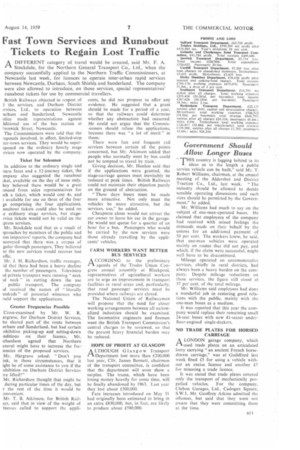Fast Town Services and Runabout Tickets to Regain Lost Traffic
Page 45

If you've noticed an error in this article please click here to report it so we can fix it.
A DIFFERENT category of travel would be created, said Mr. F. A. 1-1 Stockdale, for the Northern General Transport Co., Ltd., when the company successfully applied to the Northern Traffic Commissioners, at Newcastle last week, for licences to operate inter-urban rapid services between Newcastle, Durham, South Shields and Sunderland. The company were also allowed to introduce, on those services, special representatives' runabout tickets for use by commercial travellers.
British Railways objected in respect of 1 the services, and Durham District nvices, Ltd., to operation between ,urham and Sunderland. Newcastle olice made representations against lditional use of the bus station at r or swick Street, Newcastle.
The Commissioners were told that the :oposals involved, in effect, limited-stop iter-town services. They would be superaposed on the ordinary hourly stage :rvices now operated by the company.
Ticket for Salesmen In addition to the ordinary single and .turn fares and a 12-journey ticket, the )mpany also suggested the runabout :Ice, available on the day of issue only. hey believed there would be a great mnand from sales representatives for !eh a ticket, which would cost 4s. and ! available for use on three of the four gs comprising the four applications. unabout tickets could also be used on e ordinary stage services, but stagervice tickets would not be valid on the :press services.
Mr. Stockdale said that as a result of )proaches by members of the public and am inspectors' reports, the company had scovered that there was. a corpus of gular through passengers. They believed at the new services would recover lost affie.
Mr. J. H. Richardson, traffic manager, id that there had been a heavy decline the number of passengers. Television td private transport were running "neck id neck '• in cutting down the use
public transport. The company id received the names of " literally indreds " of potential witnesses who ould support the applications.
Greater Frequencies Possible Cross-examined by Mr. W. R. argravc, for Durham District Services, ho shared part of the route between urham an Sunderland, but had certain ohibitive picking-up and setting-down ■ nditions on their licence, Mr. chardson agreed that Northern eneral might have to increase the IreIonics of the proposed services.
Mr. Hargrave asked: "Don't you ink, in those circumstances, that it ight be of some assistance to you if the ohibition on Durham District Services :re lifted?"
Mr. Richardson thought that might he during particular times of the day, but ✓ the rest of the time it would be z.onvenient.
Mr. T. B. Atkinson, for British Railtys, said that in view of the weight of tnesses called to support the appli
cants, he did not propose to offer any evidence. He suggested that a grant should be made for a period of a year, so that the railways could determine whether any abstraction had occurred. He could not argue that the Commissioners should refuse the applications, because there was "a lot of merit" in them.
There were fast and frequent rail services between certain of the points concerned, but Mr. Atkinson added that people who normally went by bus could not be tempted to travel by train.
Giving decision, Mr. Hanlon said that if the applications were granted, the stage-carriage queues must inevitably be reduced at peak times. British Railways could not maintain their objection purely on the ground of abstraction.
"These days buses must be made more attractive. Not only must the vehicles be more attractive, but the services, too," he added.
Cheapness alone would not attract the car owner to leave his car in the garage. He would not queue for a quarter of an hour for a bus. Passengers who would be carried by the new services were those already travelling by the applicants' vehicles.
FARM WORKERS WANT BETTER BUS SERVICES
A CCORDING to the preliminary I-1 agenda of the Trades Union Congress annual assembly at Blackpool, representatives of agricultural workers are to urge an improvement in transport facilities in rural areas and, particularly, that road passenger services must be provided where railways are closed.
The National Union of Railwaymen will propose that the need for closer working arrangements between all nationalized industries should be examined. The locomotive engineers and firemen want the British Transport Commission's central charges to he reviewed, so that the present heavy financial burden may be reduced.
HOPE OF PROFIT AT GLASGOW A LTHOUGH Glasgow Transport Department lost more than f200,000 last year, air. James Bennett, chairman of the transport committee, is confident that the department will soon show a surplus. The trams, which have been losing money heavily for some time, will be finally abandoned by 1963. Last year they lost about £500,000.
Fare increases introduced on May 31 had originally been estimated to bring in an extra 030,000, but, in fact, are likely to produce about f580,000.




















































































































